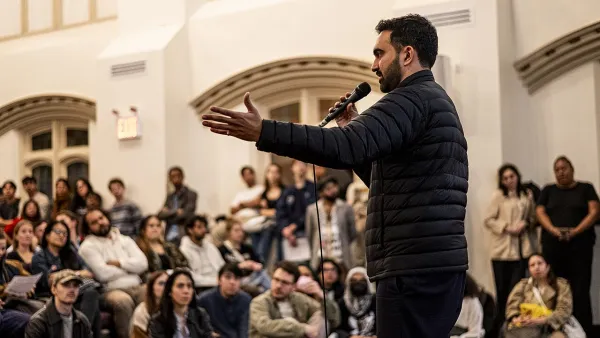Recent development controversies in New York City inspired one writer to set some priorities.

"So many development battles in major cities around the world fall into easy narratives (villainy versus virtue, for instance) that we tend to imagine them all possessing moral fault lines that are clearly visible: a set of capitalist savages on one side, and on the other, the marginalized agents of a more noble civic mission," begins an article by Gina Bellafante, who seeks to poke holes in that scenario.
The target of Bellafante's critique, are debates surrounding issues like a campaign called Save Manhattan Valley.
In this instance, the enemy was not a future condominium tower with an in-house aromatherapist and windows the height of an Italian cypress. Instead, it was the city’s planned demolition of three parking garages it owns on West 108th Street, to make space for the construction of an 11-story building that would add 258 units of affordable and supportive housing for the poor and the elderly.
There is another similar example from Sunnyside, Queens, of a proposed development made up entirely of affordable housing that would replace an existing parking lot. That project, according to Belafante, is likely to be "scotched," as residents complain about the loss of parking. Sally Goldenberg and Gloria Pazmino have since reported that the developer of that project has withdrawn a request for a zoning change.
With these examples as evidence, Bellafante makes a controversial claim, even in the nation's home of public transit: "It seems as if the moment has arrived for drivers to take the back seat."
FULL STORY: Parking Concerns Take a Back Seat in Pursuit of Affordable Housing

Planetizen Federal Action Tracker
A weekly monitor of how Trump’s orders and actions are impacting planners and planning in America.

Vehicle-related Deaths Drop 29% in Richmond, VA
The seventh year of the city's Vision Zero strategy also cut the number of people killed in alcohol-related crashes by half.

As Trump Phases Out FEMA, Is It Time to Flee the Floodplains?
With less federal funding available for disaster relief efforts, the need to relocate at-risk communities is more urgent than ever.

NYC: What Mamdani’s Rivals Can Teach Him About Transportation
The mayoral candidate won on a bold, progressive platform. Some of his opponents had even bolder ideas.

Berkeley Approves ‘Middle Housing’ Ordinance
The city that invented single-family zoning is finally reckoning with its history of exclusion.

SEPTA Budget Slashes Service by 45 Percent
The Philadelphia-area transit agency is legally tasked with maintaining a balanced budget. Officials hope the state will come to the rescue with additional funding.
Urban Design for Planners 1: Software Tools
This six-course series explores essential urban design concepts using open source software and equips planners with the tools they need to participate fully in the urban design process.
Planning for Universal Design
Learn the tools for implementing Universal Design in planning regulations.
Heyer Gruel & Associates PA
JM Goldson LLC
Custer County Colorado
City of Camden Redevelopment Agency
City of Astoria
Transportation Research & Education Center (TREC) at Portland State University
Camden Redevelopment Agency
City of Claremont
Municipality of Princeton (NJ)





























